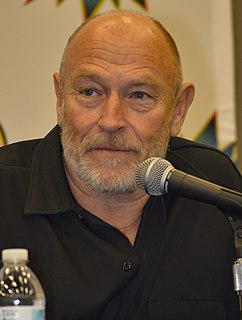A Quote by Barry Commoner
What is needed now is a transformation of the major systems of production more profound than even the sweeping post-World War II changes in production technology.
Related Quotes
At the beginning of World War II the U.S. had a mere 600 or so first-class fighting aircraft. We rapidly overcame this short supply by turning out more than 90,000 planes a year. The question at the start of World War II was: Do we have enough funds to produce the required implements of war? The answer was No, we did not have enough money, nor did we have enough gold; but we did have more than enough resources. It was the available resources that enabled the US to achieve the high production and efficiency required to win the war. Unfortunately this is only considered in times of war.
I'm attracted to directors in general because I appreciate the work and the job they have to do. I watched the post-production, I watched the pre-production... post-production is something that I'm very interested in and I did spend a lot of time in editing rooms when I was young pretending to be sick.
Directing takes a lot longer than acting. This was about seven years in development, and then two and a half years with pre-production, production, post and now the release. Not that I have people banging on my door to star in movies, but it takes me out of the acting game for a longer chunk of time.
I think I read films having grown up around the pre-production and post-production aspect of the filmmaking medium, a lot more than most young people who are in acting would have experienced. I do think about scripts in a different way. I can't just read a script as an actor. I don't know how to do that.
Financing for 'Shotgun Stories' was initiated with money from close friends and family. This is where the money to go into production came from. After production, a company called 'Upload Films' came on board and provided post-production funds and services. In both instances, people were taking a gamble on us.
One concern I had while I was working actively in the intelligence community - being someone who had broad access, who was exposed to more reports than average individuals, who had a better understanding of the bigger picture - was that the post - World War II, post - Cold War directions of societies were either broadly authoritarian or [broadly] liberal or libertarian.




































